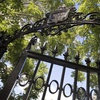O'Brien and other officials assert confidently that these charges are indeed correct. The documentation could be improved, they admit, but they stress that that is not the vital issue.
"The important thing is," says O'Brien, "was the federal money appropriately charged, not was the process perfect."
The Med School flap, and a similar dispute over an audit performed at the School of Public Health, is part of a larger national controversy between federal authorities and major research universities, many of which have suffered problems similar to Harvard's.
Increasingly complex federal regulations and Congressional worries over the stewardship of research grants has led to a number of major audits of universities' federally funded projects.
One particular source of contention has been the federal requirements that professors submit "effort reports" detailing the percentage of time spent on research, teaching, advising, and working on particular federally-sponsored projects. Although rules concerning this sort of bookkeeping procedure were recently cased, the whole idea, educators say, reflects a misunderstanding of how universities are run.
"Universities cannot compartmentalize costs as narrowly as the government would like," explains Milton Goldberg, head of the Council on Governmental Relations, which represents 100 major research universities--including Harvard--in their dealings with executive agencies.
Goldberg and other Washington lobbyists sympathize with Harvard's recent dilemma at the Med School. They said that in similar cases involving other universities, an initial uproar is made, but the final settlement is for less than 10 percent of the original charge.
While Goldberg says there is "always some truth" in the audits, the auditors are generally applying a far too fine line to universities' handling of research monies.
"HHS auditors display an attitude of: 'We're here for the sole reason of finding difficulty at your institution,'" he says, adding that the personalities of the officials in question often have something to do with this.
Federal officials, on the other hand, say the auditors are just doing their job. "One can't blame the auditors too much," elaborates Robert Newton, a senior staffer at the National Science Foundation (NSF), admitting that often the rules "don't make much sense."
He adds that government agencies are right now trying to loosen rules governing such parts of auditing as cost transfers.
And Richard J. Powers, a high financial official at the National Institute of Health (NIH), says simply that sloppy documentation often obscures reasonable accounting practices. If Harvard had better documentation, he explains, "I suspect that maybe the auditors would have recognized that [the cost transfers] were legitimate."
NSF supplied Harvard with $17.5 million last fiscal year, and NIH gave part of the $74 million in HHS funds the University received. HHS has the responsibility to audit all of Harvard's federally funded research.
Right now it is unclear what the resolution of the Med School audit will be. The audit report now is in Washington in the hands of Henry Kirschenmann, an HHS deputy assistant. Through an aide, Kirschenmann has refused comment on the eventual deposition of the case, though both Parigian and Harvard officials say there will be a period of negotiations between the government and Harvard over how much money will have to be paid back.
But this doesn't mean that Harvard's going to be conceding much to the government. Officials say they owe nothing. As Scott says, the University "is quite deliberately taking a tough attitude" in the case because of the desire to clear up the general problem, and not just come away with an expedient solution for Harvard.
Read more in News
Poet Ginsberg In Town To Sell New Book












